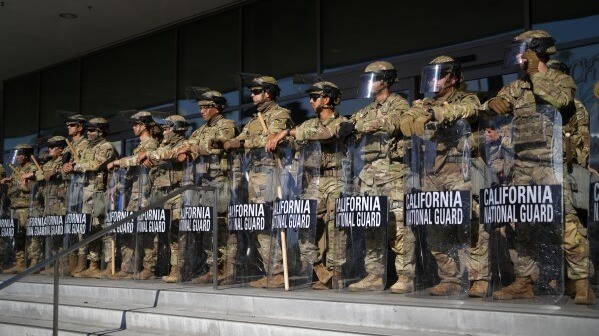The Ninth Circuit Court of Appeals recently upheld President Donald Trump’s decision to deploy the National Guard in California despite opposition from Governor Gavin Newsom. This decision has sparked controversy and misinterpretation by several major media outlets, with many suggesting it represents an expansion of federal government powers. However, the ruling reaffirms long-standing precedents concerning executive authority, not a departure from them.
At the heart of the matter was the Trump administration’s use of the National Guard to respond to unrest and violence in California cities, where federal agents and facilities came under attack. Governor Newsom, a vocal critic of President Trump, opposed this deployment, arguing that the state’s authority should prevail in matters of domestic peacekeeping. A lower appellate court sided with Newsom, attempting to curtail Trump’s ability to activate the Guard without state consent. That decision was recently overturned by the Ninth Circuit, which rightly recognized that the President’s authority, particularly under the Insurrection Act and relevant precedent, allows such action.
While critics framed the decision as a federal encroachment on states’ rights, the ruling actually aligns with foundational case law that has long shaped the boundaries of executive power. In my opinion, two cases, Martin v. Mott (1827) and Luther v. Borden (1849), provide the constitutional and legal backbone for the court’s decision.
In Martin v. Mott, the U.S. Supreme Court ruled that the President holds the exclusive authority to determine when an exigency exists justifying the mobilization of state militias. Writing for the Court, Justice Joseph Story declared that the President’s judgment in such cases is conclusive. This means that if the President determines that laws cannot be properly executed due to violence, rebellion, or resistance, he is fully empowered to act — even without state approval. This legal foundation has never been overturned and continues to inform federal military authority today.
Luther v. Borden similarly reinforces that matters related to insurrection, rebellion, and the legitimacy of state governments are inherently political questions, not ones for the courts. Originating from the Dorr Rebellion in Rhode Island, the case involved a clash between two rival governments: Yes, America experienced a time when a state had two separate governments feuding for control over a state. The Supreme Court declined to rule on which faction was legitimate, leaving that determination to Congress and the President. The case upheld the principle that when civil authority breaks down, the use of military power — including what is now the National Guard — to restore order falls squarely under the federal executive’s domain. The Dorr Rebellion in Rhode Island provides the historical reference from which the National Guard was founded.
The Ninth Circuit, in its reversal, also implicitly criticized the lower court’s failure to apply these landmark decisions, suggesting, in my opinion, the lower court ruling was influenced more by political alignment than sound legal reasoning. This is not a new concern. California’s appellate courts have developed a pattern of issuing rulings that appear more reflective of the ideological leanings of Democratic leadership than of consistent legal interpretation.
Notably, most decisions have gone against law enforcement officers, particularly those who have taken steps to expose corruption within their departments. These outcomes suggest a judicial climate in which skepticism toward law enforcement, possibly influenced by broader political movements such as “defund the police,” may cloud objective judgment. As a result, officers who act lawfully and in good faith, even while blowing the whistle on misconduct, are sometimes met with unfavorable decisions that undermine their efforts to ensure accountability and integrity within the profession.
In this instance, they once again attempted to rebuke a federal executive decision, only to be corrected upon closer scrutiny by a higher court.
The Trump administration’s argument was rooted in a legitimate concern: federal agents and facilities were under physical attack during protests that devolved into riots. In some areas, including Los Angeles, local law enforcement was reportedly ordered not to cooperate with federal officers or ICE agents, creating a dangerous vacuum of authority. In such circumstances, the Insurrection Act provides a lawful path for the President to deploy the National Guard to protect federal personnel and assets.
Furthermore, California’s status as a sanctuary state can be viewed as an institutional barrier to the execution of federal immigration laws. When a state not only declines to enforce, but actively obstructs federal law enforcement, it can trigger federal intervention under statutory powers designed precisely for such breakdowns.
Some legal scholars argue that this issue may eventually reach the Supreme Court, but if it does, the outcome seems likely to favor the executive branch, given the clarity of existing precedent. The court is unlikely to undermine long-held principles of presidential authority in matters of national security and domestic insurrection.
In conclusion, the Ninth Circuit’s decision is a restoration of legal balance and executive clarity. It reaffirms that in times of domestic upheaval, the President has not only the right but the responsibility to protect federal interests, especially when local leaders refuse to do so. Far from expanding federal power, this ruling simply honors what has been settled law for nearly two centuries. The alternative, allowing political disagreements to endanger federal agents and weaken national authority, would indeed set a dangerous precedent for the republic.
